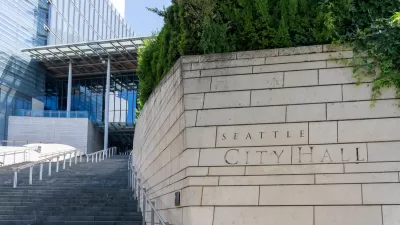Developers in Seattle have been building ultra-compact apartments to provide alternatives to high housing prices. But these "aPodments," which take advantage of loopholes in codes, could bring negative consequences with the large increase in density.
In the Emerald City, dozens of microhousing units are being built on what were once single-family lots. This increasingly common kind of housing "offers a way to reconcile rising urban housing prices with a financially struggling generation's preference for city living," says Claire Thompson, and "is now prompting passionate debate over the best approach to urban landfill." Such developments are a creative way of building affordable housing, but face opposition from "wealthy homeowners who don't want younger, poorer folks flooding their neighborhood, competing for parking spaces, blocking their views, destroying local character, and depreciating neighboring property values."
Another problem, says critics, "is not the idea of density itself or the types of new neighbors it could bring, but the backhanded way Seattle developers have gone about capitalizing on the trend." San Francisco has updated its city code to allow small units and New York is piloting "micro-apartment" projects, but Seattle is allowing developers to count multiple microapartments as one large unit and bypass standard design and environmental reviews. "If aPodments start showing up on every block," said Carl Winter, a representative of neighborhood group Reasonable Density Seattle, "that's an incredible increase in density, and they're never going to study what that density would do."
The Capitol Hill Community Council submitted a resolution to the Seattle City Council asking for a moratorium on new microapartments until the design-review loophole is closed, says Thompson, but it doesn't sound like the city is seriously considering it. "We're observing them and intend to do a little more study," said Mike Podowski, land use policy manager for the city's Department of Planning and Development.
FULL STORY: Peace in a pod: How tiny apartments could reshape the big city

Maui's Vacation Rental Debate Turns Ugly
Verbal attacks, misinformation campaigns and fistfights plague a high-stakes debate to convert thousands of vacation rentals into long-term housing.

Planetizen Federal Action Tracker
A weekly monitor of how Trump’s orders and actions are impacting planners and planning in America.

In Urban Planning, AI Prompting Could be the New Design Thinking
Creativity has long been key to great urban design. What if we see AI as our new creative partner?

Portland Raises Parking Fees to Pay for Street Maintenance
The city is struggling to bridge a massive budget gap at the Bureau of Transportation, which largely depleted its reserves during the Civd-19 pandemic.

Spokane Mayor Introduces Housing Reforms Package
Mayor Lisa Brown’s proposals include deferring or waiving some development fees to encourage more affordable housing development.

Houston Mayor Kills Another Bike Lane
The mayor rejected a proposed bike lane in the Montrose district in keeping with his pledge to maintain car lanes.
Urban Design for Planners 1: Software Tools
This six-course series explores essential urban design concepts using open source software and equips planners with the tools they need to participate fully in the urban design process.
Planning for Universal Design
Learn the tools for implementing Universal Design in planning regulations.
Gallatin County Department of Planning & Community Development
Heyer Gruel & Associates PA
JM Goldson LLC
City of Camden Redevelopment Agency
City of Astoria
Transportation Research & Education Center (TREC) at Portland State University
Jefferson Parish Government
Camden Redevelopment Agency
City of Claremont





























